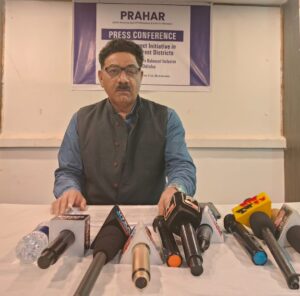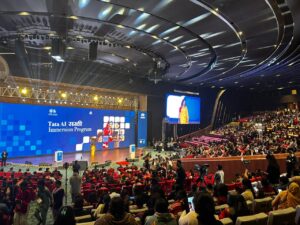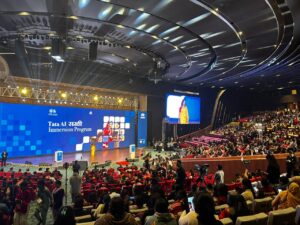Vedanta Aluminium’s ‘Jeevika Samriddhi’ project nurtures growth and prosperity for Jharsuguda Farmers

In the heart of Jharsuguda, the story of transformation and hope unfolds through Vedanta Aluminium’s ‘Jeevika Samriddhi’ project. The project’s emphasis on sustainable farming practices and improved irrigation systems has become a beacon of hope for farmers in this region. The success of the project can be gauged from the fact that even during the pandemic, it provided a steady source of income and opened avenues to directly sell farm produce through ‘Farm to Shop’ platforms through a robust supply chain model.
Transforming Lives and Empowering Communities
Arjun Naik, a farmer, from Siriapali Village in Jharsuguda District, Odisha, assumed that year-round farming was next to impossible. “With water scarcity and health issues, life was a daily struggle for me as my family had to make a daily trek of around 2 km to fetch water which exhausted our energy and resources. Further, my health issues aggravated, adding to our woes, forcing me to stop working as a daily labourer which was my only means of income,” he mentions.
“It was during these testing times that Vedanta’s ‘Jeevika Samriddhi’ initiative became a glimmer of hope for us”, beams Arjun. “Both my wife andI, benefited from the training and irrigation system support provided by Vedanta and today, our farmland thrives with cash crops such as tomatoes, chillies, and sweet corn, ensuring a stable income. My wife, Kavita, is a happy woman who not only contributes effectively to household expenditures, but also takes pride in educating our children and managing my medical expenses.”
Naresh Patel, another success story, reflects a similar transformation. “Initially I was a conventional farmer who primarily grew paddy and a few vegetables, struggling to make ends meet. But everything changed from the moment I became a part of the ‘Jeevika Samriddhi’ project. The training sessions on natural pest management and organic farming methods gave me a larger perspective on sustainable agriculture and paved the way for evolving as an agricultural entrepreneur. Now, I cultivate a range of cash crops like ginger, chilly, coriander, bottle gourd and many more which is fetching very good returns,” Naresh attributes.

Arjun Naik and Naresh are just two among the985families whose lives have been transformed by the Jeevika Samriddhi projectin the villages of Gudigaon, Keldamal and Siriapali.
Sowing the Seeds of Change
Vedanta Limited, Jharsuguda, initiated the first phase of this unique farm-based project involving 111 farmers on a pilot basis in one of the villages, which was completed in 2017. Following the stupendous success of the project, the second phase was launched covering 330 farming households in Jharsuguda.
To further fortify this initiative, Vedanta roped in agricultural scientiststo train the farmers on advanced agriculture practices and sustainable methods of farming. Over 13,000 hours of training have been imparted to the farmers on areas such as crop planning & management, post-harvest management, Package of Practices (PoP), with more than 89% farmers benefiting from the sustainable agricultural practices.
Reaping Bountiful Harvests
Today, farmers, who were part of the project, are engaged in cultivation round the year due to improved irrigation facilities which has reduced dependency on rains. Moreover, adoption of cash crops has also increased, with 77% of farmers enhancing their monthly income by 50%.
Promising a Greener Tomorrow
Now into its third operational phase, Vedanta’s ‘Jeevika Samridhhi’ project is set to broaden its scope to 3 more villages of 2 Gram Panchayats (Dalki &Parmanpur) in Jharsuguda District.
This third phase of the project focuses on orienting farmers about the adoption of climate-resilient agricultural techniques, establishing soil and water conservation structures, and introducing supplementary irrigation systems (such as solar and drip irrigation) to enhance reliable irrigation resources.
The program also aims to stimulate sustainable agriculture by refining crop management practices through Integrated Pest Management (IPM) and Integrated Nutrition Management (INM). Additionally, farmers will be familiarized withestablishing market linkage through local institutions, community-based organizations, water user groups, farmer’s producer groups, village development committees, and similar avenues.
In a world where success is often measured in profits, Vedanta’s ‘Jeevika Samridhhi’ project tells a different tale. It’s a story of growth intertwined with the community’s well-being, a testament to the fact that true prosperity blooms when nurtured collectively.
The Ongoing Phase – An Overview
The project’s third phase focuses on water conservation, modern agricultural practices, and farmer capacity building. Key interventions include renovating and constructing water harvesting structures and irrigation infrastructure, promoting advanced farming techniques such as SRI paddy cultivation and trellis systems, supporting organic farming, and emphasizing climate-smart agriculture practices. The initiative prioritizes sustainability through community involvement and the empowerment of farmers via Farmers’ Producer Organizations.
Key Interventions:
- In eight intervention villages, the project has benefited 985 farming households, aiming to improve their socio-economic conditions. It has achieved a 45% increase in average productivity through the promotion of SRI (System of Rice Intensification) and a 20% reduction in cultivation costs.
- Secured irrigation has been provided through the installation of six solar-based borewells, benefiting over 30 farmers with 30 acres of land, enabling year-round crop cultivation.
- Construction & Renovating of 3 community ponds, 5 farm ponds & 9 farm bunds covering more than 70 farmers & approx. 100 acres of land securing irrigation facilities in off-monsoon season & water conservation with enhanced capacity of approx. 35000 CuM
- Over 290 farmers have been trained in Integrated Nutrient Management (INM) and Integrated Pest Management (IPM) practices. This training has led to reduced chemical use, increased crop yields, and improved soil health, contributing to sustainable agriculture and a healthier environment.
Case study in 200 words:
From Barren Land to Bountiful Harvest: Surendra’s Transformation with Jeevika Samridhhi
Surendra Patel, a 45-year-old farmer from Kumudapali village, faced a challenging life with his wife Kumudini and their daughter. Despite dedicating himself to vegetable farming on his 3.5-acre plot, his traditional methods produced minimal yields and meagre income of around 50k annually, making it hard to support his family.
Everything changed when the Vedanta Jharsuguda CSR’s Project Jeevika Samridhhi introduced a solar-based irrigation system and the WADI model to his village. This intervention allowed Surendra to adopt modern farming techniques, diversifying his crops to include fruit varieties like Apple Ber, Lemon, and Moringa, along with leafy greens such as Coriander, Palak, Pudina, and Radish. His previously barren land soon flourished into vibrant, productive fields.
Within just four months, Surendra’s income increased significantly. He harvested 1,550 kg of Radish, 220 kg of Coriander, 360 kg of Palak, 425 kg of Kosala, and 220 kg of Pudina, generating approximately 1 lakh from vegetables alone. The solar irrigation system enabled him to plan for 3-4 cultivation cycles each year.
This transformation has brought not only financial improvement but also a renewed sense of hope and pride for Surendra. He is now optimistic about his daughter’s future, envisioning better educational opportunities for her, thanks to the impact of the Jeevika Samridhhi initiative. Surendra Patel’s journey is a testament to the power of sustainable agricultural innovation.
Shri. Manoranjan Nanda – Assistant Director of Horticulture, Jharsuguda, who has been closely associated with this project, remarked, “Jeevika Samridhhi is positively impacting a large number of farming households by introducing them to advanced agricultural practices as well as to the best practices in land and water management. Today, in the third phase, installation of solar irrigation system in existing bore well& other water harvesting structures has augmented the irrigation infrastructure and enhanced irrigation potential as well. The implementation ofirrigation facilities & other water harvesting structures supports farmers in cultivating a variety of hybrid vegetables, including leafy greens. The SRI method (System of Rice Intensification) of paddy cultivation has increased the average crop productivity and average income enhancement of farmer beneficiaries. I’m hopeful that the third phase would really transform the agricultural landscape in Jharsuguda”.





